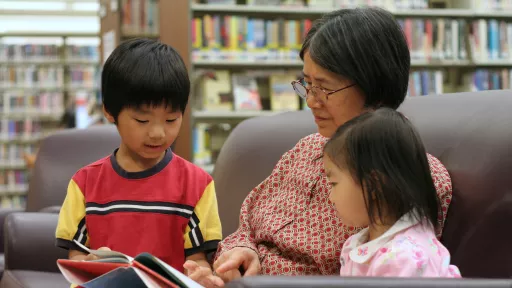As your child’s first teacher, you have prepared a solid pre-reading foundation by providing a language rich environment and role modelling the fun of reading stories. The next stage of translating the written word on the page requires explicit teaching to help unlock the alphabetic letter code (graphemes) and the sounds they make (phonemes). This will begin at school.
Try not to force your child to learn to read or read aloud, as it will become a chore and they may lose confidence. When your child is ready and would like to read to you, avoid being critical about mistakes and instead praise their efforts of what reading knowledge they have used. Reading aloud to a pet or toy can help overcome the fear of getting the words wrong, as well as modelling your own mistakes when reading aloud. If your child gets stuck with a word, try and encourage them to have a go using their knowledge of letters and sound and their understanding of the book.
Reading together is a fun activity to share with your child, even when independent reading has begun. Books that are ‘just right’ for your child to read will help build independent reading confidence. Listening to stories and continuing to read word rich texts together, increases your child’s vocabulary and demonstrates the phonetics (sounds) of words.
If your child is struggling, seek out their teacher or make contact with your maternal health nurse. You may also like to support your child by focusing on phonological awareness; reading together, assisting with letter recognition, playing with rhyme and alliteration, clapping out syllables or using robot voices to segment words.
Decodable or phonics readers are a great way to begin reading instruction as they help break down the reading code rather than relying on memory, guessing or picture clues. The difficulty of this code is progressed gradually with each level. Sight words or flash cards require memorisation of individual words whereas phonics instruction empowers the child with the rules of reading, allowing them to read words they may not know.
For more information, talk to friendly library staff or read our Junior Early Readers and Early Reader kits page.
More resources
You can find advice for more reading stages on our Literacy and reading resources for families page. We also recommend registering for the 1000 Books Before School program on our 1000 Books Before School page.
For more information and services for you and your child, visit our Primary school 5 to 10 years page.
Digital resources for children
Overdrive eBook collection: access hundreds of great picture book and early reader titles. You can access this through the Overdrive website. You can also download the Libby app to read eBooks on the go.
Kanopy Kids: not just for movies, this service also has over 200 popular picture books that have been animated for a unique storytelling experience. You can access this through the Kanopy Kids website.
Story Box Library: find a wealth of top Australian picture books, read aloud by some of our favourite authors, actors and performers. Make a playlist and settle in for storytime, anytime. You can access this through the Story Box Library website.
Programs for early primary 5 to 8 years
We offer a range of events and activities for children.
To find more events and programs:
- Visit our Children's storytime and activities page
- Subscribe to the Boroondara Library service newsletter
- Follow us on Facebook, Twitter and Instagram
- Follow us on Eventbrite
You can also see all the fun school holiday programs across Boroondara on our School holiday activities page.
Chinese storytime – English and Mandarin
Wed 3 December 2025
